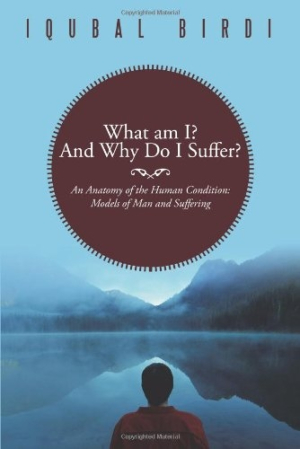What Am I? And Why Do I Suffer?
An Anatomy of the Human Condition: Models of Man and Suffering
Complex questions are outlined in an easy-to-understand way, and are best savored slowly.
What Am I? And Why Do I Suffer? by Iqubal Birdi is an intellectual examination of the complexities of human life that is at once personally intimate and universally all-encompassing.
Taking a multidisciplinary look at the question of human identity and the integral role suffering plays in the definition of what it means to be human, the book offers at least one deep issue that every person can relate to: “life-threatening illness, bereavement, divorce, relationship breakdown, bankruptcy, redundancy, homelessness, retirement, natural disasters, war.” Birdi examines life from physical, spiritual, social, and other perspectives, providing insight into how to overcome these challenges. This holistic approach fits well with the universal nature of the question of identity, and provides insights (not necessarily neat, tidy answers) that quench mental thirst.
The main body examines views of mankind, discipline by discipline: the sciences of man’s place in the cosmos and his innate endowments, religion, sociology, and interpersonal and spatial relationships. The book studies what it means to see man as a small part of a large universe, how man’s ability to learn affects who he is, and what impact day-to-day relationships have on man’s identity. The use of the gendered man could be interpreted as outdated, but most of the book uses more inclusive terms like people, individuals, and humans.
The conclusion summarizes the main topics of the book, but rather than feeling repetitive it provides a concise look at the broad swath of information explored. Then Birdi offers brief recommendations from each of the disciplines on how to minimize suffering and maximize emotional and psychological health. These recommendations—such as “Learn to be aware of what emotions and feelings are yours, and own them” and “[Increase] the feel-good chemicals in your brain…through…exercising, meditation, yoga, relaxation, laughing more, eating a healthy diet, and engaging in positive social and intimate relationships”—may seem simplistic, but they prove to be powerful coping mechanisms in light of the lifelong nature of suffering.
The title provides a hazy view of what the book will be about. Does the pronoun I refer to the author or the reader? And what rather than who only makes sense once the academic content and tone of the book are known. The subtitle (An Anatomy of the Human Condition: Models of Man and Suffering) clears up the key ideas of the book—humanity and suffering—but the scholarly wording limits the appeal of what could be a unanimously compelling topic.
The book is rather slim for such a weighty topic. As a result, it’s accessible to people who are curious but don’t want to dive in too deep. Birdi’s uses many complex terms and concepts, but he explains them so they’re easy to understand. However, the combination of concise book and complicated topics can be exhausting, with one key concept following right on the heels of another. The book is best savored slowly in order to digest ideas.
Reviewed by
Melissa Wuske
Disclosure: This article is not an endorsement, but a review. The publisher of this book provided free copies of the book and paid a small fee to have their book reviewed by a professional reviewer. Foreword Reviews and Clarion Reviews make no guarantee that the publisher will receive a positive review. Foreword Magazine, Inc. is disclosing this in accordance with the Federal Trade Commission’s 16 CFR, Part 255.

